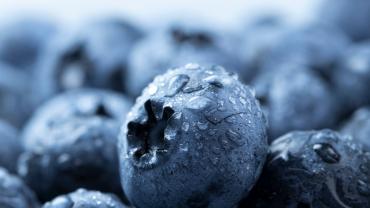
Prebiotics are compounds that have a specific effect on the gastrointestinal (GI) microbiome and help stimulate the activity of the targeted intestinal microbe to potentially help promote human health. To be classified as a prebiotic, the compound must not be absorbed in the GI tract and should instead be fermented by GI microbes.
Examples of prebiotics include fructans such as inulin, fructooligosaccharides, and galactooligosaccharides (GOS). GOS have been shown in studies to stimulate several genera of beneficial microorganisms including Bacteroidetes, Firmicutes, Enterobacteria, and particularly Lactobacilli and Bifidobacteria.
Blueberries (Vaccinium spp.) and other dark berries contain a relatively high number of health-supportive compounds. These include anthocyanins, a group of flavonoids that appear dark blue or purple, that have been shown to support cellular health, antioxidative status, and mitochondrial health. The phenolic compounds in blueberries are thought to act as prebiotics due to their varying degrees of bioavailability.
Research indicates that blueberries may significantly alter gut microbial composition. They may also help support the function of short-chain fatty acid (SCFA)-producing bacteria. In a laboratory study assessing the potential impact of eight types of berries on the gut microbiome, blueberries were shown to have the highest abundance of types of anthocyanins. Blueberries were also shown to help increase the populations of SCFA-producing bacteria including Prevotella and Barnesiella genera. Of note, the authors of the laboratory study reported that the eight types of berries tested all had different impacts on the microbiome.
In addition to supporting gut microbial health as a prebiotic, blueberry may also support vascular health. Results from a randomized controlled trial indicate that supplementation with blueberry for one month increased certain parameters related to endothelial function including flow-mediated dilation. Improvements in certain other biomarkers related to cardiovascular health were also observed.
Blueberries may also support cognitive health, the gut-brain axis, and healthy aging. A clinical trial involving adults over the age of 68 explored the changes to cognitive function and brain imaging in the presence of blueberry supplementation. The treatment group received a daily equivalent to one cup (approximately 148 g) of whole blueberries daily for 16 weeks. Results of functional MRI imaging in the treatment group showed increases in signaling in several brain regions while the placebo group experienced decreased activation in certain brain regions.
Dark berries such as blueberries may help support antioxidative status, vascular health, and cognitive function. Research indicates that they may also support gut microbial health.
By Colleen Ambrose, ND, MAT